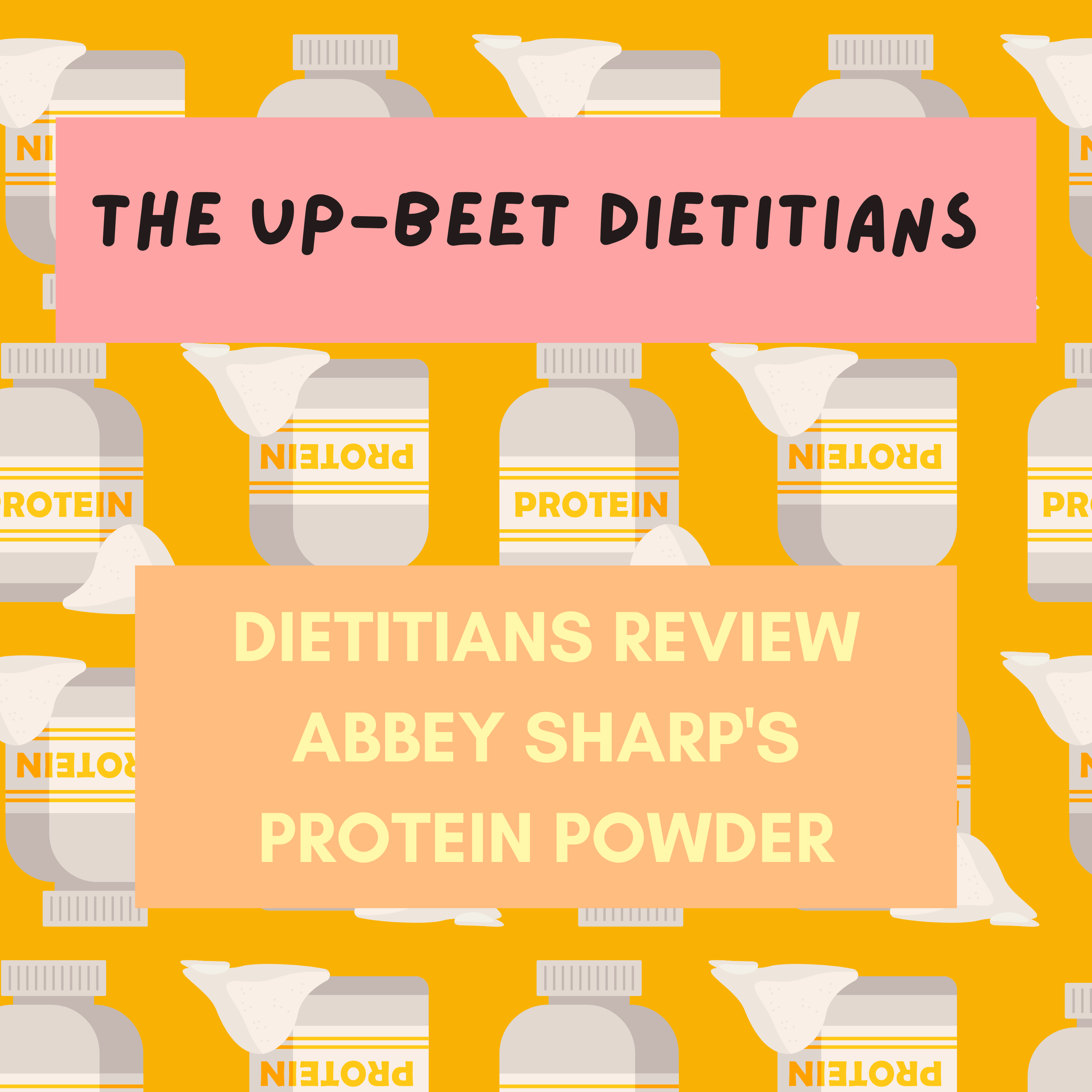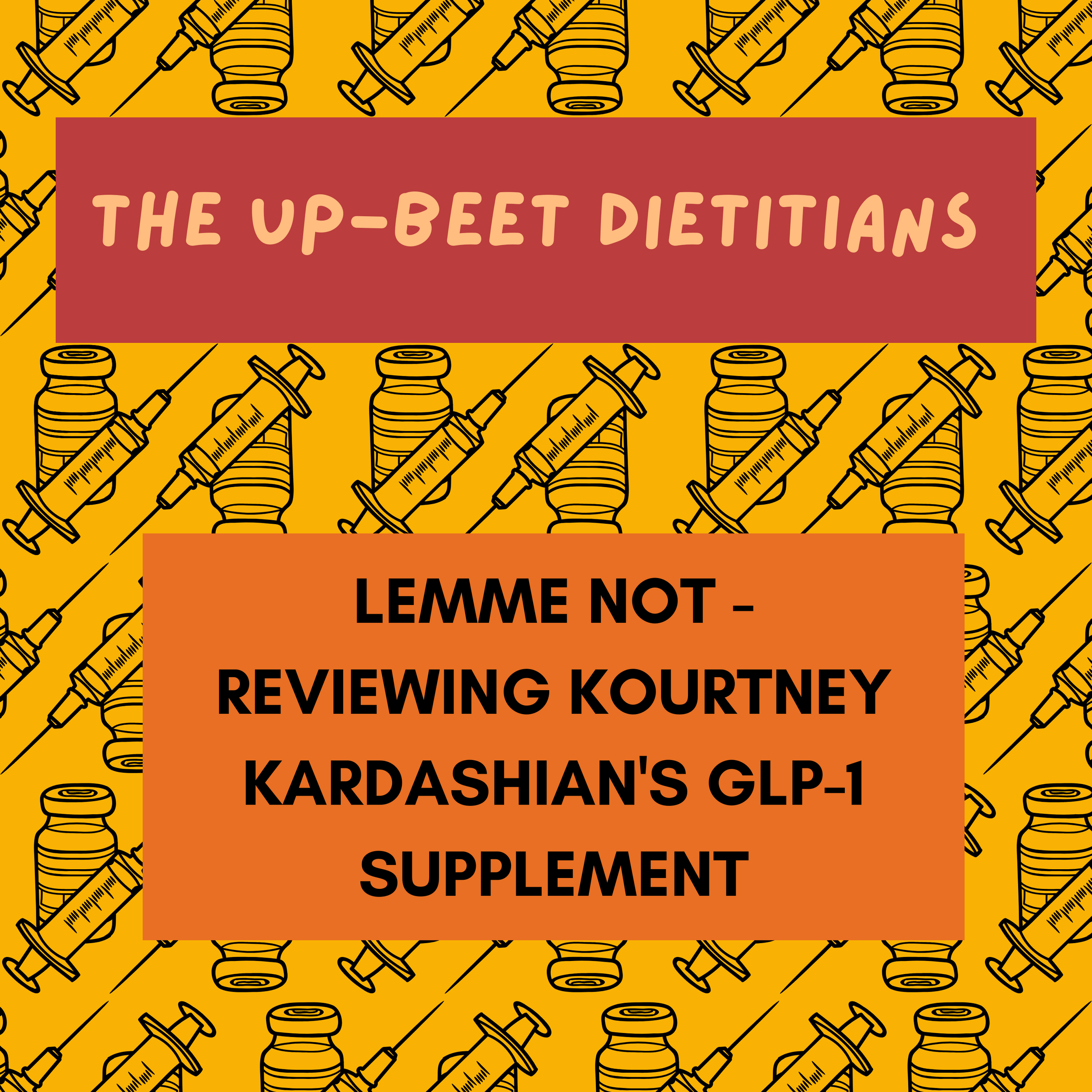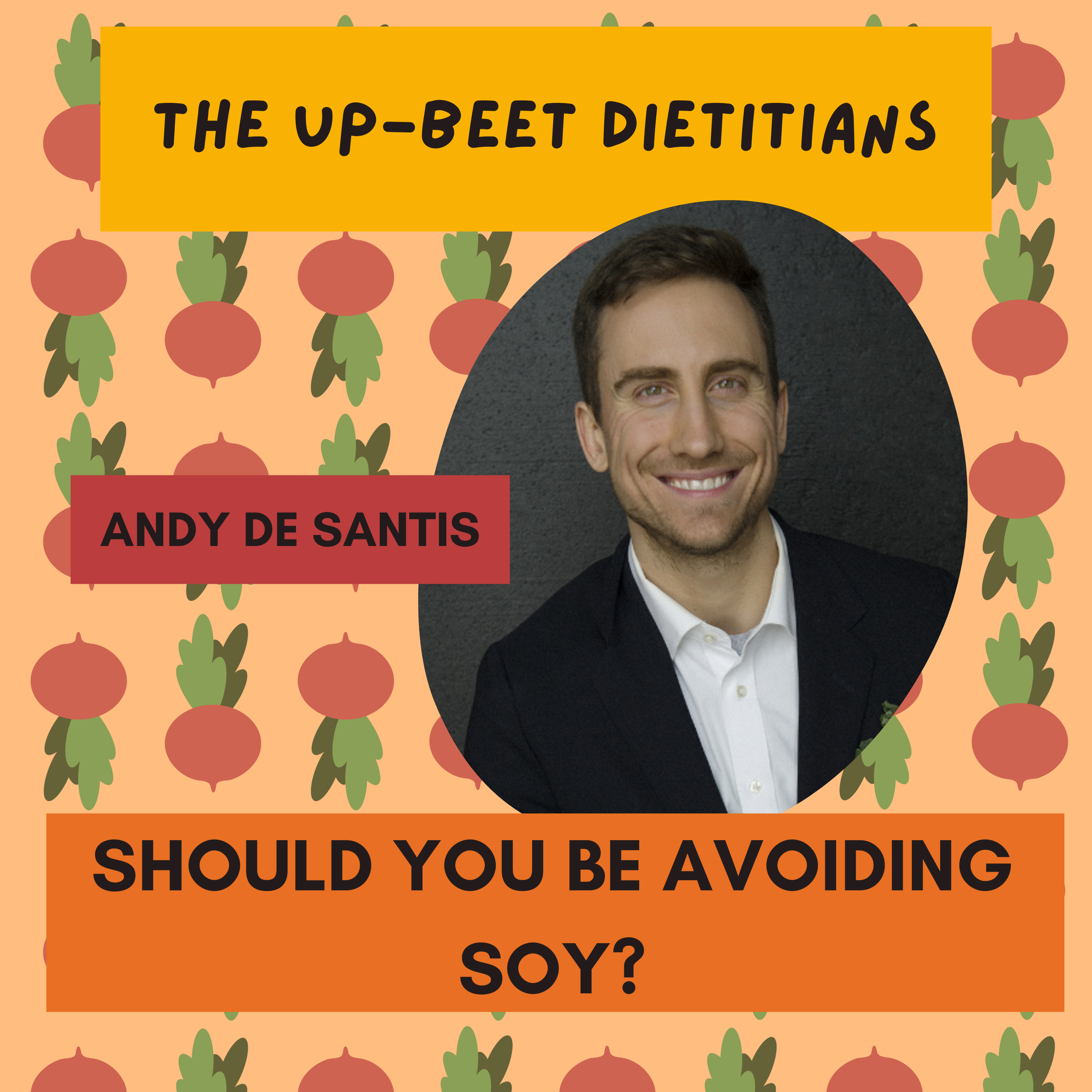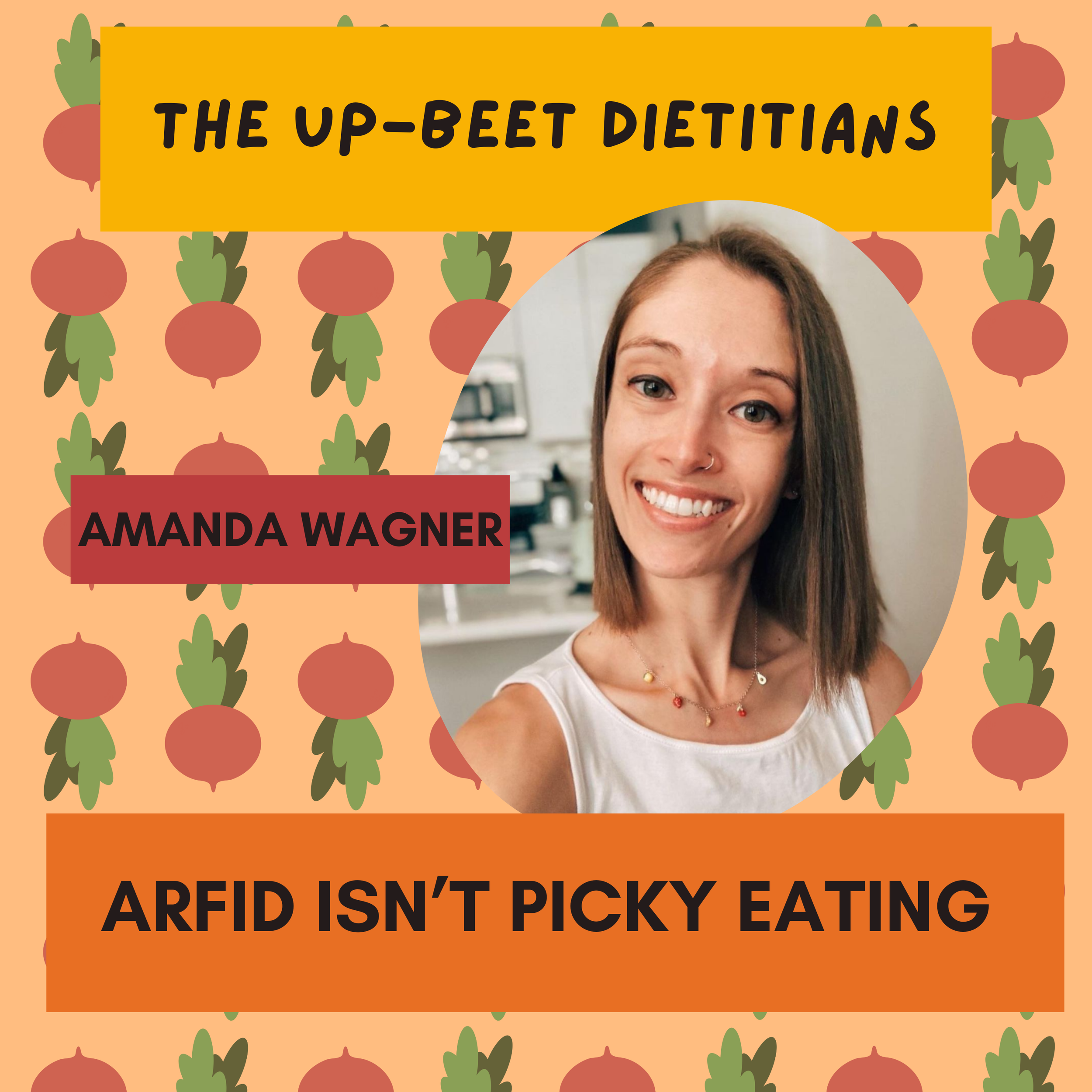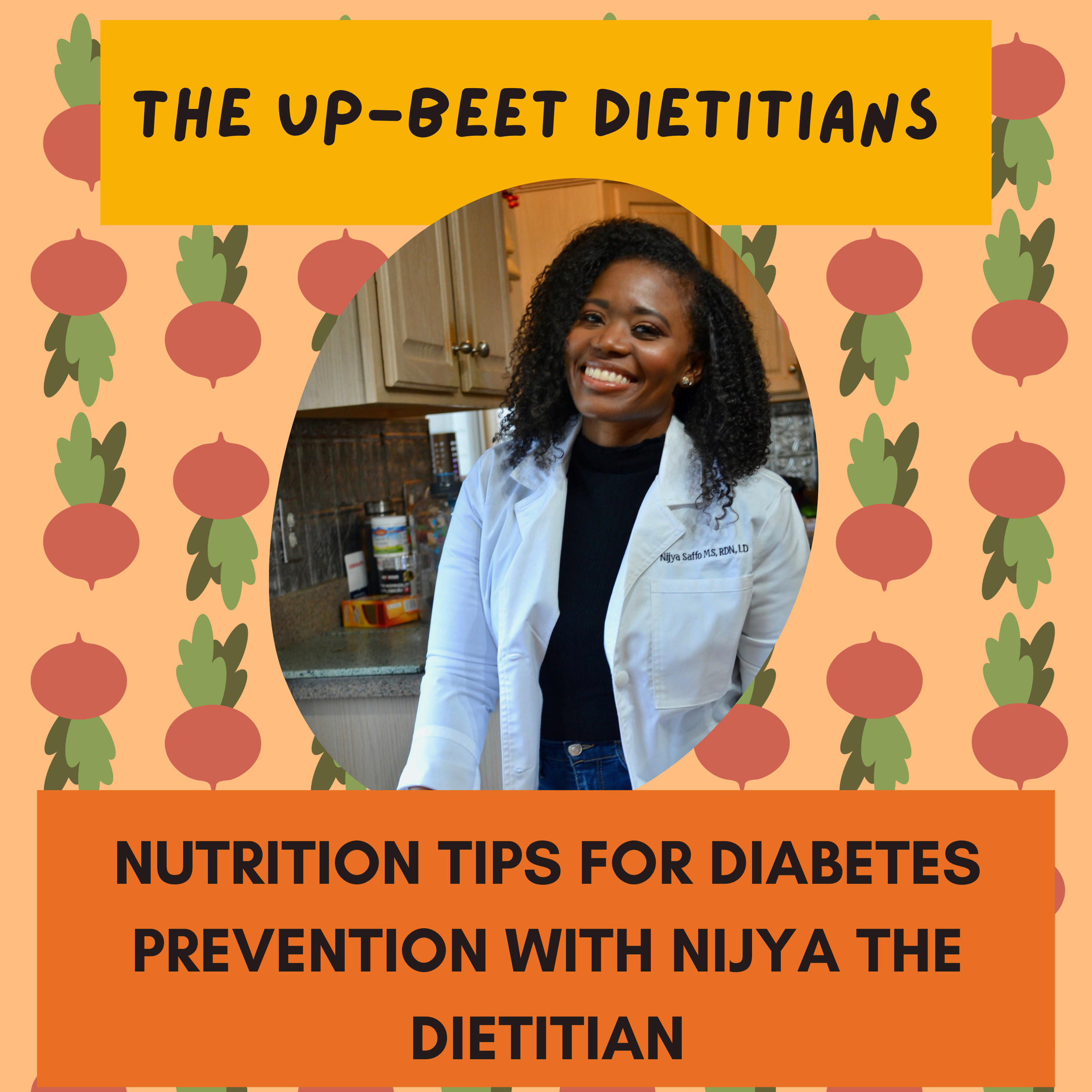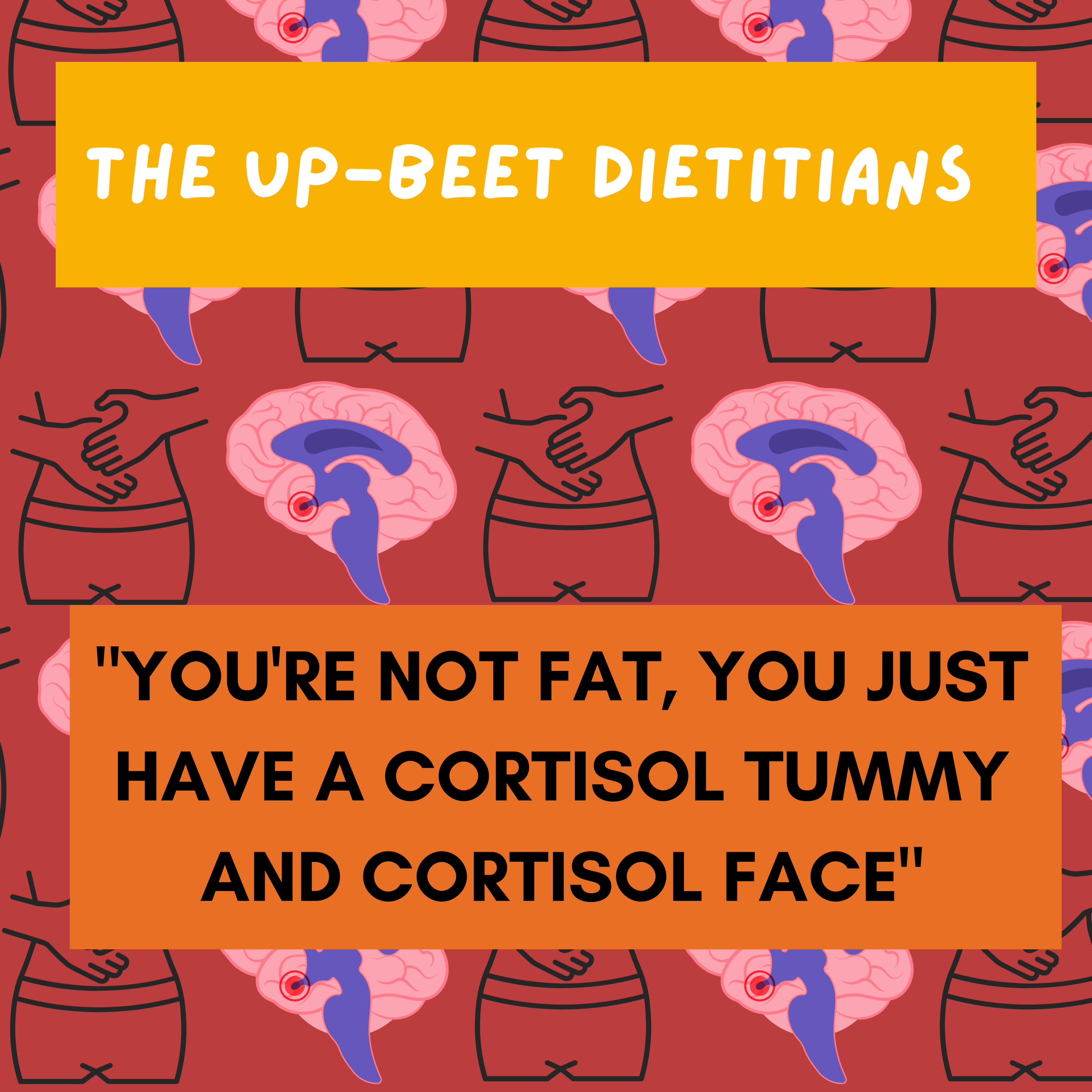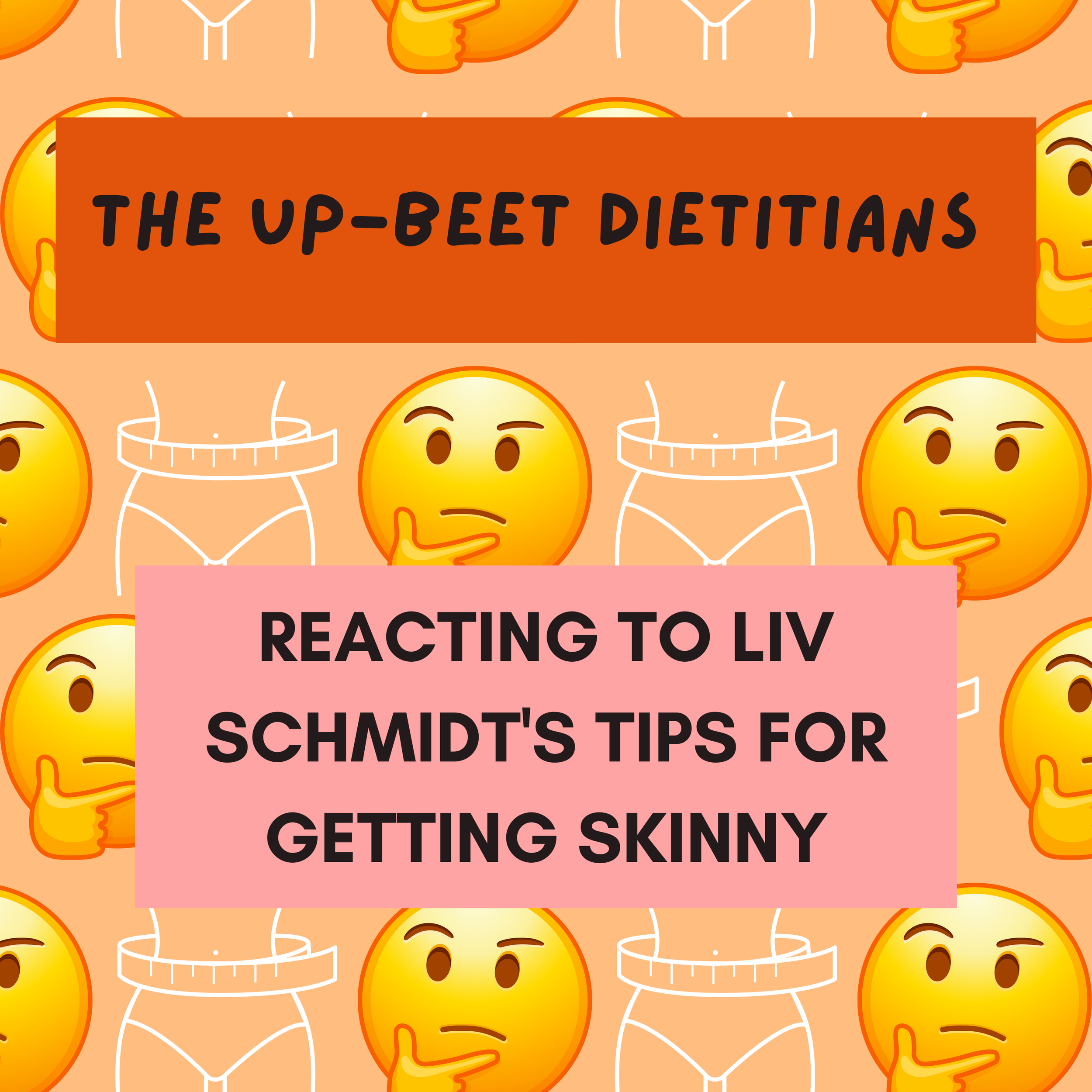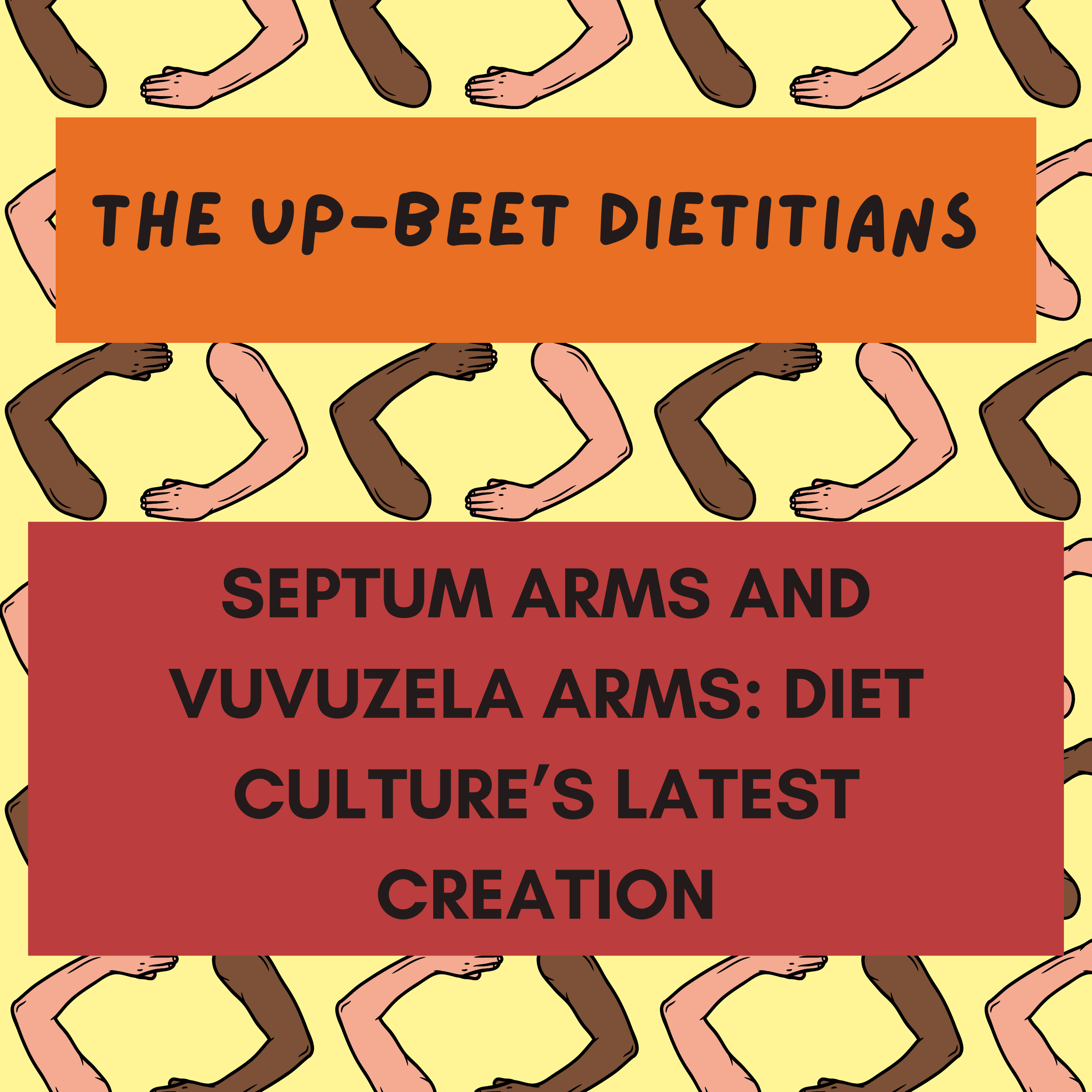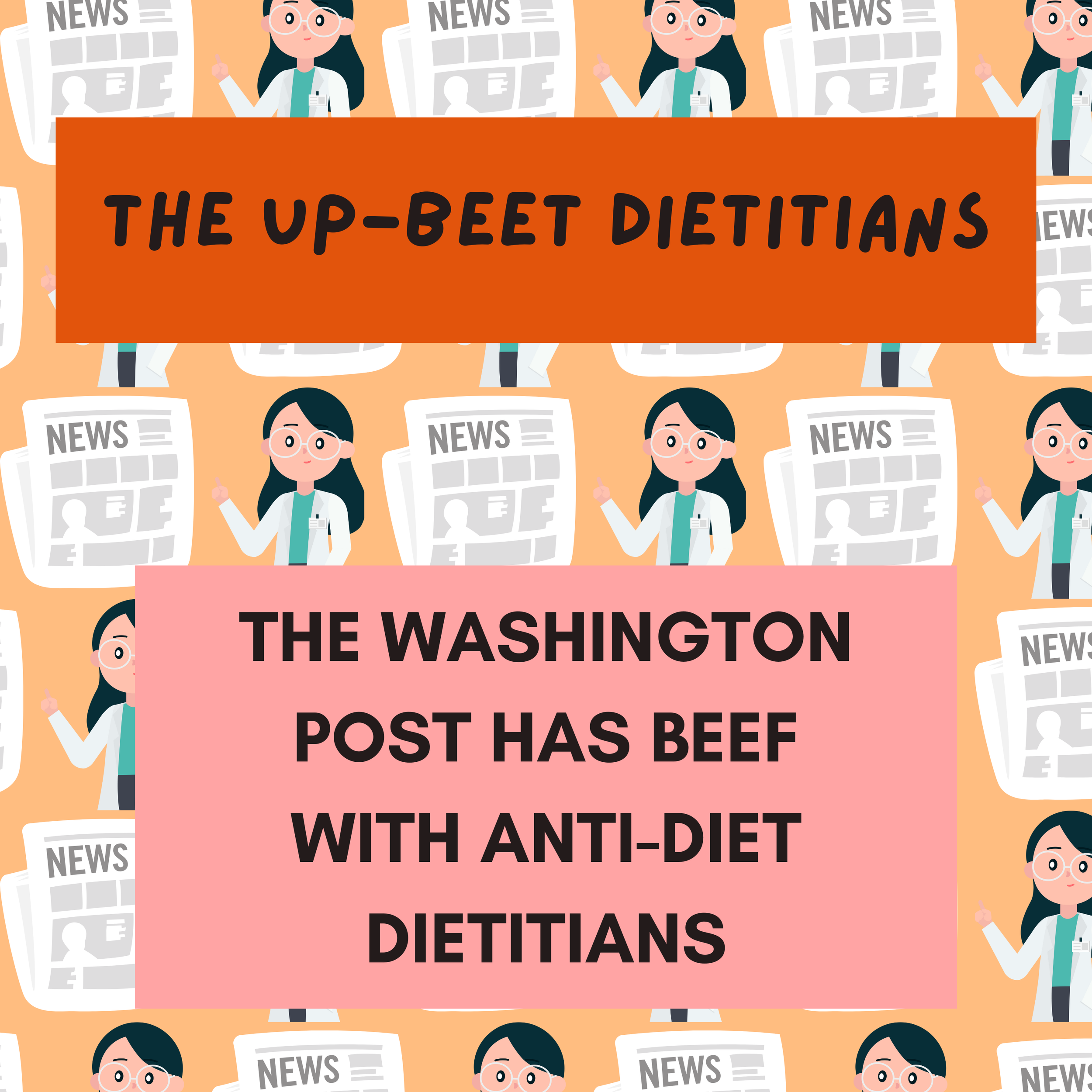Episode 137: Can Nutrition Help Manage PCOS?
Listen to the episode
Watch on YouTube
Episode Description
In this episode of The Up-Beet Dietitians podcast, Emily and Hannah are joined by Sam Abbott, a fellow dietitian passionate about PCOS. Sam talks about what Polycystic Ovary Syndrome (PCOS) is and how it is diagnosed. Sam dives into why weight loss is commonly prescribed for PCOS and potential risks for this recommendation. She breaks down the logic behind gluten-free, dairy-free, and low-carb diets being recommended for PCOS management. Lastly, she discusses some non-diet approaches you can start incorporating if you have PCOS. For more with Sam, listen to our bonus episode exclusive on Spotify!
Sam Abbott, MSEd, RD, LDN, is a registered dietitian nutritionist who helps those with PCOS ditch diets and balance hormones without feeling guilty or stressed about food. She is the owner of PCOS Nutrition Company, where nutrition coaching services are centered around improving hormone balance without a side of diet culture or weight stigma. In her Nourished with PCOS Program, she empowers people with PCOS to find peace and balance with nutrition, hormones, body and life. You can find Sam on Instagram at @pcos.nutritionist or on her podcast, the Nourished with PCOS Podcast, where she gives free tips and support around managing PCOS without dieting.
More resources
PCOS Podcast episodes: https://pcosnutritionco.com/nourished-with-pcos-podcast/
Do I Have PCOS? https://open.spotify.com/episode/7AwKnYqQJzjuGvNPwcq8KF?si=GoZwK_GuSVWtQX7yW2fCSQ
Do I Have Insulin Resistance? https://open.spotify.com/episode/3gTXDB0plOx7PJUKffi8Ri?si=DnNA9cVUTQGX0rsc84KPBw
PCOS Community w/ Membership: https://pcos-nutritionist.mykajabi.com/nourished-with-pcos-collective
Tune in on Spotify, Apple Podcasts, or YouTube to listen.
-
0:08
Hello everybody, Welcome back to a brand new episode of the Upbeat Dietitians Podcast.
We are joined by a brand new guest Today.
We are joined by Sam Abbott, who is a Registered Dietitian nutritionist who helps those with PCOS ditch diets and balance hormones without feeling guilty or stressed about food.
0:28
Sam is the owner of PCOS Nutrition Company, where nutrition coaching services are centered around improving hormone balance without a side of diet, culture or weight stigma.
In her Nourished with PCOS program, she empowers people with PCOS to find peace and balance with nutrition, hormones, body and life.
0:46
You can find Sam on Instagram at PCOS dot Nutritionist or on her podcast The Nurse with POCOS Podcast where she gives free tips and support around managing PCOS without dieting.
We will also include all of her socials in the description so you can check them out there.
1:04
But enjoy.
We're excited.
Hello everyone.
Welcome back to another episode of the Uppi Dietitians Podcast.
Hello everybody and hello Sam.
Welcome to the Pod.
Hi.
Thank you so much for having me on.
I'm excited.
1:20
We are so excited you are our first guest to join us to talk about PCOS.
And.
We have.
We have lots of listeners who we know struggle with this, so we are psyched.
To go over this topic today.
Oh, I'm so excited too.
PCOS is so common and people don't really realize it.
1:38
Yes, I feel like so much more.
Lately.
I've been hearing about it too, which it's it's good that it's getting diagnosed more, but of course not a lot of resources are out there, so it's going to be a great episode for them.
Yes, it definitely is awesome.
I can't wait to jump in.
So excited.
1:53
Well, before we get into the juicy stuff, walk us through, you know what you do for work a day in the life.
Hobbies.
Kind of give our losers a little bit into a little insight into who you are.
Well, my name is Sam Abbott, I'm a registered Dietitian nutritionist and I own PCOS Nutrition company, which is a private practice that helps people manage PCOS without dieting or food restriction.
2:19
I don't actually have PCOS myself, I just became very interested in PCOS after having client after client after client who was struggling with PCOS.
And when I started specializing in PCOSI actually had a brick and mortar practice in Charlotte, NC where I live.
2:39
And I would just see so many clients who they were struggling and they kept coming to me because their doctor told them that they needed to lose weight and things just really weren't adding up to me.
Like I felt like that advice was really not helpful to anyone.
2:57
So I just became really interested in learning everything I could about PCOS and I started specializing it and I also got very into PCOS advocacy and fighting for better legislation that can help support PCOSA.
3:14
Lot of people don't realize what a big role government plays in healthcare and PCOS resources.
I think people like when they think about health insurance in a broader picture, they understand that the government plays a role.
But with PCOS advocacy, for many years we were just asking Congress to allow for PCOS to be recategorized with the NIH so that it could receive more funding for research.
3:44
Because research funding for disease states all depends on the NIH category, and it was previously categorized only as a reproductive disorder.
So it wasn't really getting a lot of money for funding.
So got really involved in POS advocacy right now.
A big thing that's going on is drug development trying to get a PCOS specific medication because right now there is no FDA approved medication for PCOS.
4:12
The things that are commonly prescribed are like Metformin and birth control, but it's really considered off label use to prescribe those for PCOS.
So yeah, I'm just really passionate about being a dietitian and helping people take a non diet approach to managing PCOS.
4:33
In terms of hobbies and things that I like to do, I love animal rescue.
I have two rescue dogs, Olive and Winnie, who frequently make appearances in my Instagram.
I'm also very into interior design and architecture and we've really been into home renovation.
4:52
We're finishing up a house right now, so that's really exciting as well.
I've been loving watching your home renovation stuff.
It's so I I've never done it myself, but I always have like friends who have renovated a house and it just seems like so much work, but so fun and like, hopefully so worth it too at the end.
5:11
Yeah, it's.
I love just being able to do something that has nothing to do with nutrition and being in a weight inclusive space can sometime.
I know that you all both know how stressful it can be with trying to use social media to connect with clients and all of the back and forth that can come with that sometimes.
5:34
So I just love having an outlet where I can be creative and, you know, visually and spatially planned things and I don't have to argue with people about BMI.
What a life.
5:50
Yeah.
Yeah.
Well, it's so cool that you're so involved in the advocacy side of it and whatnot.
And I I'm really glad you brought that up because that is something that I don't think people like, think about.
Like, just the different how the disease is labeled, like how that can play into future care and whatnot and research.
6:14
So that's really cool.
So let's talk about what PCOS is, though, 'cause we talked about how you're so passionate about it, passionate about advocating for it, working with clients, 'cause you saw just the prevalence of it, but what exactly is?
PCOS.
So PCOS stands for Polycystic Ovary Syndrome.
6:34
The name is very confusing because you don't actually have to have SIS to have PCOS and actually the type of cyst that burst or have to get surgically removed have nothing to do with PCOS.
So the name is very confusing and I think they're actually there's a big discussion about changing the name to something like that has to do with metabolic syndrome.
6:57
So I kind of expect that to happen sometime down the road.
But PCOS is a a metabolic endocrine and reproductive disorder.
It affects up to 20% of women and people born with a uterus, and it's characterized by kind of a bunch of different symptoms.
7:18
A big one is our regular cycles, or maybe a missing cycle.
Physical symptoms of elevated androgens like acne, hearsutism, which is excessive hair growth, hair thinning along the top of the hairline.
7:34
It's the leading cause of an ovulatory infertility.
But it's also a lot more than that.
Like when we say it's a metabolic condition, PCOS increases the risk of developing type 2 diabetes, sleep apnea, endometrial cancer, fatty liver disease, and it's associated with anxiety and depression.
7:54
It's wild how many different, like, bodily systems it impacts.
It's just so crazy, Yeah.
It is, and we don't really know what causes PCOS.
It is not caused by your diet, is not caused by weight.
8:10
We think it's actually a combination of genetics and environmental factors, like being exposed to environmental endocrine disruptors like BPA, or maybe being exposed to elevated androgens when you're in utero.
8:29
But your reproductive system, a lot of people don't realize your reproductive system works with other systems in your body.
It's not a system that just completely exists by itself.
I've heard that, you know, a period is just like a vital sign, and I could totally see that when you think about PCOS.
8:48
So yeah, the root causes of it Inflammation.
Insulin resistance can affect the entire body.
That makes so much sense.
So much sense.
So how?
Sorry.
Go ahead, Emily I.
Was just gonna say it's also crazy how many people it affects, like 20% is quite, quite a bit.
9:09
A hefty number, yeah.
Yeah.
And I don't know if it's that it's affecting more and more people or that there's just more awareness around it because it is AI.
Don't want to say it's a difficult thing to diagnose, but diagnosing it is a little, it's not as cut and dry.
9:31
And so a lot of people go undiagnosed until they go off of birth control or they're trying to get pregnant.
But I think now because of social media and the awareness, people are connecting the dots themselves and going to the doctor and asking to be tested.
9:47
So I think that awareness is great.
So I don't know if the increase in how many people have PCOS is because of that or just more and more people are actually getting it.
Right.
Yeah.
We wanted to ask you that too.
How exactly does it get diagnosed, especially being a relatively new diagnosis compared to, you know, say type 2 diabetes, for example.
10:09
How?
How does it get?
Diagnosed.
So PCOS is a diagnosis of exclusion, meaning that other things need to be ruled out first before PCOS can be diagnosed.
10:24
Which is really frustrating to people 'cause they go to the doctor and they're like, I think I have PCOS and they feel like they're being dismissed.
Or maybe they are being dismissed while their doctor's looking into other things.
But there are three pieces of criteria and you have to meet two of them, but you don't have to meet all three.
10:46
So the first piece is a regular or missing periods.
The second piece would be polycystic ovaries.
This usually is seen on a transvaginal ultrasound.
And there's specific criteria of what they're looking for on your ovaries.
11:05
Like I said, that this is not about the type of cyst that painfully burst or the type of cysts that need to be surgically removed.
They're looking for excess follicles from where your body is trying to ovulate and it can't.
11:22
So they kind of look like a little string of pearls on an ultrasound.
Something new in the new PCOS guidelines are you can use AMH levels in place of an ultrasound.
11:40
So AMH is your anti malarian hormone and it's commonly elevated in PCOS from those excess follicles.
So with the new guidelines, you know, they say like if you have elevated AMH, you don't have to go through the trouble of having an ultrasound that that AMH level kind of takes care of that piece of criteria.
12:01
And then the third piece of criteria would be elevated androgens either by taking a look at your labs or just by going off of physical signs and symptoms.
So hirsutism is the biggest physical sign that can indicate elevated androgens.
12:23
So this could be facial hair, hair on your chest, hair on your stomach, hair on your back.
There's actually a score that your doctor will use.
It's called the Fairman Galway score, where they go through different parts of your body and assign a numerical value to the amount of body hair you have.
12:40
And that's how they diagnose hairsuitism.
So the reason that they use signs and symptoms for diagnosing androgens rather than only labs is because evaluating elevated androgens can actually be pretty difficult.
12:57
They're most accurate in the morning on the first day of your cycle, and some androgens actually change with age as well.
So physical signs and symptoms, hirsutism, acne, something called androgenic alopecia, which is hair thinning on your head with the acne specifically, it's more like cystic acne along the jawline.
13:20
So yeah, three pieces of criteria, you only have to meet two.
But all of that criteria can also overlap with other things like thyroid issues, Cushing's disease, hypothalamic amenorrhea which is over exercising and under eating.
13:43
There's a handful of medical conditions that can also 'cause these symptoms.
So they really need to be ruled out first.
Definitely not as cut and dry as people, probably.
Would like no.
And I I really hate that people feel dismissed and I am not saying that's right at all but I get a lot of DMS from people who tell me that they have they think they have PCOS but their doctor dismissed them.
14:11
Or I was even at a work event this fall.
And somebody when I met her, she told me that she had PCOS.
And then a couple of days later when we were talking in Deb, she was like, well, I know I told you that I had PCOS, but I tried to get diagnosed and my doctor totally blew me off and she said that I don't have PCOS.
14:32
And I was like, Oh well, why do you think you have PCOS?
And when she told me her symptoms like she definitely those did not meet the diagnostic criteria at all.
So I would say that if you're trying to get a diagnosis of really having an open conversation and asking your doctor a lot of questions, you know, if you feel like you're being dismissed, like ask your doctor, why don't you think I have PCOS?
14:56
Or if you're running labs, you know what specifically are you checking for in place of PCOS?
That's good advice.
Good advice because it is, I'm sure, so tricky because it isn't.
Like Emily said, it's cut and dry.
It's not like this one lab value and boom, you get a diagnosis.
15:12
There's so much that goes into it that's tricky.
Yeah.
And my, I was actually talking to my own gynecologist about this or her office and they were like everybody comes in thinking that they have PCOS and they're having to pay for all these labs and testing.
15:30
And we're we're trying to like be sensitive and accommodate people, but also trying to explain what's going on.
But you know, I think that also speaks to the faults of healthcare systems where, you know, people don't feel like they're getting good communication with their providers.
15:47
And there has been some research that shows the average person with PCOS needs to see three to five physicians before they get a proper diagnosis, which is not OK and I think speaks to a much bigger issue.
Well, that's a great segue into our next part, which is about the treatment of PCOS.
16:08
Cause of course it's hard enough to get the diagnosis, getting treatment on a condition that's not very well known.
I can't even imagine being in the patient's shoes.
What I so frequently hear from patients who have PCOS is of course weight loss being recommended and I want to get into that like why?
16:29
Why is weight loss so commonly, like the first go to thing, like a doctor might recommend for someone who has PCOS?
Yeah.
It's so frustrating.
Where do I even begin?
Loaded question.
16:45
Yeah, it's such a loaded question.
A couple of things.
The root issues with PCOS are inflammation and insulin resistance.
And so, you know, within the medical community there is a strong thought that if you lose weight, if you have less adipose tissue, then your body is going to be more insulin sensitive and that is going to help your inflammation.
17:14
I think this logic is flawed in a lot of different ways because number one, we don't really have any tools that lead to permanent weight loss.
You know, most people who try to intentionally lose weight will regain back all of the weight and sometimes even more weight.
17:35
So first of all, I think it's futile advice anyway.
But also we see in research, and this is in the new PCOS guidelines, This is not just me being a non dietitian, but insulin resistance and inflammation with PCOS occur independent of weight.
17:54
We have research from, you know, adolescent girls and we see that insulin resistance occurs independent of BMI.
So I think it's very flawed to say like OK, well we have these root causes and we know they occur independent of BMI and independent of weight, but then we're going to focus on weight.
18:19
I think also because PCOS is a metabolic condition, it can increase your risk of like heart disease and diabetes and things like that.
Physicians automatically think of weight loss.
And you know, blood sugar management is really important for PCOS.
18:37
And I I think that's another big thing too.
If your physician sees blood sugar going up, they're going to tell you to lose weight because in their mind they think that's helpful advice.
I also think that weight gain is commonly seen as like a symptom of PCOS.
18:58
And so I think there's a thought, you know, if my PCOS is improving, then I should be losing weight.
Again, I think that logic is flawed.
I was at a symposium where there was a big conversation amongst physicians where they see weight with PCOS more dependent on geographic area rather than PCOS in and of itself.
19:25
So on average, people with PCOS don't weigh more than people without PCOS, and that in many areas where body weights tend to be lower.
That's the same with PCOS.
And there was an endocrinologist in the chat from Spain and he said that a majority of his patients with PCOS are thin.
19:47
So I think that this is another area where you know, having a conversation with more curiosity around the topic of weight versus just talking about PCOS as like a weight condition is really important.
I also think it's very important to mention that when we look at symptoms like a regular missing period, acne hears autism, hair loss, elevated labs, fatty liver, diabetes.
20:17
All of those can be improved even if weight loss does not occur, they can all be improved independent of weight.
So I think that's just another important thing to keep in mind.
Yes to all of that.
Like not only is there's so many other things we could do besides pursue weight loss, but even if like even if weight loss was an appropriate, let's say prescription for PCOS, we don't have an evidence based way for sustainable long term weight loss to be maintained over a long period of time.
20:54
So like again, even if it did work so to speak and PCOS could be improved and you have less symptoms, we don't have a way to pursue weight loss that doesn't have such a high risk of leading to you know, binge type eating, other disordered eating and eating disorders, you know, weight regain.
21:12
It's just it's not a sustainable approach, even if it does quote UN quote work for some people if they get a decreased weight.
Yeah.
And this is something that I hear from my clients all the time.
You know, I've tried everything I can to lose weight and I just can't.
21:29
And I have diabetes and I'm trying to manage my blood sugar.
And I'm like, OK, well, I trust your lived experience.
So if you've tried everything you can to lose weight, and you haven't been able to, that is a sign that maybe your body is where it wants to be, and instead we should focus on the actual behaviors within your control.
21:53
That can help with blood sugar regulation.
I'm so glad you said that.
Hannah and I talk about it all the time how like weight is seen as a behavior and it's like it's an effect of potentially behavior changes, but not like saying like, oh, I'm gonna lose weight like that's something completely controllable.
22:19
There are other things that go into factor than that.
Yeah.
And I can totally understand where that expectation would come from.
I mean look at diet cultural around us, look at like our weight centric healthcare in the United States.
22:36
I mean, I understand where that comes from and I think it can be a really big leap for people to go from deeply feeling like their weight is the end all be all for health to then completely viewing weight as something independent of health.
22:54
So I like to encourage people to just take some steps to separate those.
Like even if you still care about your weight and weight loss, can you view these other symptoms independently?
Like, can you approach this with curiosity?
23:09
Can you say, I'm gonna focus on what's within my control and I'm just gonna see what happens?
And that's what I do with my clients a lot.
And they're shocked when their A1C goes down, Their triglycerides get better, their fatty liver labs are better, they get their period back and they're like, I have not lost any weight.
23:32
And I'm like, yeah, because these are independent things.
And like, I understand where that desire is, but I it hurts seeing people hold themselves back from pursuing health because they're focusing on this one outcome.
23:49
It's it makes so much sense why they feel that way because we are just like constantly being told, even from our medical team, that weight loss is the way to go and that there's no way we can improve our PCOS or any other condition that maybe applies if we're not pursuing weight loss.
24:08
So it makes so much sense why they might feel like, like you said shocked if these things do improve and weight doesn't.
And it can be so hard to, like, detach from that when you're just so used to that being the the one thing that you're.
Always pursuing?
Yeah, definitely.
24:25
And we do know that people with PCOS are at a much higher risk of developing an eating disorder, especially binge eating.
And when I'm working with clients individually, I do see a lot of disordered eating thoughts and behaviors.
24:42
And I think this needs to be a really big part of the conversation as well, because mental health is part of physical health.
And so we need to be talking about these things together.
Yeah, exactly.
24:59
Well, Speaking of that, actually another great segue here.
We're just kind of naturally moving right along when it comes to nutrition for PCOSA.
Big one that I hear, and I'm sure people who have PCOS hear all the time too, is what foods they need to cut out, especially gluten and dairy, those who tend to be the biggest ones that I hear.
25:18
I'm not a PCOS specialist, but do you feel like those are the two big ones that you tend to hear a lot too?
Or are there any others?
In terms of myths, those are the two biggest ones.
I also hear cut out carbs a lot as well and I I kind of view those pieces of it, the cut out carbs advice different from the gluten in dairy.
25:42
I think gluten in dairy, that advice is just more fear mongering diet culture like fake nutrition advice kind of.
If you see an influencer or a professional tell you to eliminate gluten in dairy, for PCOS that is a giant red flag.
26:02
A giant red flag because that's not evidence based advice.
There's been no research about gluten and PCOS, period.
That advice comes from this idea that gluten is inflammatory.
26:18
And since PCOS is inflammatory, we should eliminate gluten.
And that advice is so misguided because the topic of inflammation in general with diet culture, it just there are so many things in life that can be inflammatory, and gluten can be inflammatory to some people, it doesn't mean it's inflammatory to all people.
26:41
And things like poor sleep and stress are inflammatory too.
And it's just, you know, do we need to be nitpicking, eliminating certain foods versus focusing on more impactful things?
The the advice about cutting out dairy.
27:00
There's been mixed research about dairy and hormones and PCOS.
In some people, eliminating dairy can be helpful for PCOS, especially with acne in some people.
27:17
In some research we've seen that dairy intake can help with fertility.
So it it it has been research that consuming full fat dairy is better than low fat or fat free.
It's better for androgen levels and insulin resistance.
27:34
And this can feel a little confusing because a lot of people with PCOS have elevated lipids so they're like I was told not to have any fat in my dairy.
But yeah, full fat dairy can be helpful for PCOSI also forgot to mention with the gluten too, that a lot of whole grains include gluten and whole grains can be so helpful.
27:59
They can be rich in fiber for that's great for blood sugar balance.
They can also be great for heart health as well.
So it's unfortunate that people are eliminating those sources of nutrients that can have positive health outcomes.
28:16
And eliminate.
Eliminating them can increase that risk of binge type eating or any other eating disorder.
Like, that's actually one of the biggest causes of especially binge eating is that restriction.
And of course the pursuit of weight loss too ties right into that as well.
28:32
So it makes so much sense why when people who have PCOS hear this advice of cutting things out, you must lose weight.
But the development of disordered eating or eating disorder is pretty likely to happen, yeah.
It's interesting that you bring that up because in the PCOS research space that is very rich in healthcare providers, people are like, we need to look into why disordered eating is so much higher with PCOS.
29:03
And I'm like, whoa, probably give you give you a little bit of idea.
People are not eating enough.
You're telling people to cut out all these food groups.
You're telling them they need to lose weight.
Like it's like the perfect storm for an eating disorder.
29:19
And yeah, not eating enough and being overly restrictive and cutting out food groups.
This is like the foundation of binge eating.
Yeah, makes so much sense.
Yeah.
I would love to hear your thoughts on the advice about cutting out carbs, because you said you kind of see that one a little bit differently than the dairy and gluten.
29:44
Yeah.
And then the reason that I said that I see it a little differently is just because it comes from the idea that if you the it's related to insulin resistance, this idea that if you drastically cut carbs, you're gonna see better blood sugar regulation, which yes, if you're eating a lot less carbs, your blood sugar is probably going to be lower.
30:08
However, that's not necessary and it's also not sustainable.
And this is really where I do a lot of deep work with my clients because they're scared of eating carbohydrates, they're scared of eating fruit, they're scared of bread and pasta and things like that.
30:25
You can totally eat these types of foods and still balance blood sugar and manage your symptoms.
It does require a little bit more thought.
But what I see a lot with my clients and even like just my community on social media is people just go through these cycles of like trying to restrict and then falling off the wagon, trying to restrict and then falling off the wagon.
30:49
And then all of a sudden their blood sugar is elevated.
And it's like this panic of just kind of realizing like what I'm doing is not working.
And so if anybody listening has been in that situation, you don't have to be so restrictive to manage blood sugar.
31:05
Yeah, carbs are always the book man these days for so many conditions, PCOS included.
So I guess that said then, if you know restricting cutting out gluten and dairy, cutting out carbs, pursuing intentional weight loss likely aren't going to be the best way to treat your PCOS.
31:23
What are some non diet approaches that you do you do usually recommend for those who have this condition?
Well, this is going to sound very basic, but starting out by eating regularly and eating enough that's like Ground Zero and it.
Sounds 30 times a day.
31:40
It sounds so basic, but it's, I have to say it because so many people are skipping meals and it's leading to overeating and binging later.
So eating regularly and eating consistently throughout the day, that's so much better for blood sugar.
32:00
Like if you are going to a meal and you know you're gonna enjoy a carbohydrate rich meal at dinner, that doesn't mean that you don't eat any carbohydrates for the rest of the day like earlier in the day.
You know you still want to eat consistently, so that's Ground Zero.
And then having a diet that is rich in protein and fat and fiber and omega-3 fatty acids, that is going to be something that can be really supportive of balanced blood sugar and decreasing inflammation.
32:33
We always talk about like nutrition by addition, like rather than cutting out this, cutting out that, let's make sure we're getting enough fiber, enough protein, the Omega threes, I'm guessing for like the inflammation side of things, right?
Is that just the benefit of that?
Yes, there's actually been research on omega-3 fatty acids and PCOS, and they can be helpful for inflammation and insulin resistance.
32:56
Very cool.
So yeah, and like all foods really, really can fit.
And cutting things out we've realized as not only is it not going to help, but it can even make things worse.
Worse with inflammation and blood sugar being out of whack and you know weight yo yoing.
33:14
So I think.
Yeah, that's the way to.
Go.
I'm glad that you brought that up, Hannah, because weight cycling is actually linked to worsening inflammation, worsening insulin resistance, poor body image, worsening mental health, cardiovascular issues.
33:35
These are all things that people with PCOS deal with anyway, so why are we going to be making them worse?
With this weight cycling?
It's so much better to just let your body settle at whatever it's set point ranges.
Emily I feel like we say these things constantly.
33:53
It's, it's just.
I feel like it's nice though, to hear it from someone else.
Exactly.
They're probably like a place, actually.
True, yeah.
Saying.
It.
You know, I'm not.
Here's the thing.
If you have diabetes, I'm not saying like if you go out and have an extra large coke, that's not gonna impact your blood sugar.
34:16
That's not what I'm saying.
I'm not saying that desserts don't impact your blood sugar.
I'm saying that if you have a food that you enjoy, we can find a way to fit it in and you can still balance your blood sugar and not feel stressed about food.
34:32
I'm glad you said that.
I feel like that is the biggest misconception with a non diet approach is that we're just saying it's just whatever, eat whatever you want, whenever you want it, whatever portion you want.
That's not what we're saying.
We're saying that all foods can fit, but the beauty of not restricting is you'll be able to like learn what like portions feel good for you, what amount of like protein, fat, and fiber feels best at meals.
34:56
There's just so much more freedom and permission to actually do what feels good without cutting things out, which we know is going to lead to you doing more of that binge type eating in the future.
Yeah, and I think too, that nutrition advice, there's a spectrum, right?
35:14
Because if you're somebody who is really struggling with disordered eating, we need to focus on just helping you eat regularly and eating enough like it can be stressful to bring in a lot of that nutrition.
35:32
I don't care if you're eating a dessert and that's making your blood sugar high.
We can talk to your doctor and adjust your medication to help with that.
You know, like healing, your disordered eating is the most important thing.
And then when you feel like you're in a good place, if you want to bring in some of that gentle nutrition, nutrition by addition, like, then we can definitely do that.
35:58
That's a good point, too.
We talk a lot about how that usually needs to come last.
So we're not turning, you know, protein, fat and fiber into a brand new diet.
That's sort of like when you're ready to start focusing on nutrition.
Those things may help.
But first and foremost is eating enough.
36:14
Eating consistently and improving that like mental health side of things.
Too, Yeah.
And I do see that a lot, people turning, pairing carbs with fat and protein and fiber, that's like the new diet, and people feel like they're doing really well as long as they're doing that.
36:34
But managing PCOS is a lot more than that.
It's about giving yourself space to have that flexibility with food too, yeah.
And also just figuring out where they're at, I'm glad you mentioned that as well.
Just like where someone's at like looks completely different And it's always goes like as us from a healthcare professional standpoint to assess that, but also to make sure that they know they're not just going to be given like one thing or they just have to start going out there and adding the protein and fat.
37:10
Maybe they're not ready for that yet, but.
Yeah.
And I, there's much, a much bigger conversation going on in the PCOS healthcare space now about this.
And just in general, you know I was observing a conversation with physicians and they were talking about how when it comes to like increased risk of cardiovascular disease with PCOSA, physician was like well, I think it's really important to remember that anxiety and depression are linked to an increased risk of heart disease too.
37:50
So we're not just focusing on exercise and diet, we're focusing on the whole person.
And I think that directly relates to eating too, because what I see with my clients is a lot of anxiety and depression comes from having PCOS and dealing with poor healthcare and families who don't get it or want to obsess about dieting and weight.
38:14
And it's a lot.
Yeah, I know.
I get comments all the time on social media saying things like from trolls saying things like you only ever focus on the emotional side of eating or I only ever see you post about eating quote UN quote junk food.
38:32
And that's because there's plenty of content out there about like what healthy eating should look like, Yadda, yadda, yadda.
But there's not enough representation about, like you said, like how anxiety and depression can impact your, you know, heart health or your blood sugar levels.
38:51
Like we we know to eat fruits and vegetables, except for the carnival people, I guess.
But we generally, like, know all these things, and so we gotta like, dig a little bit deeper and talk about the other stuff that impacts our health too, 'cause there's so much more to it than just food and exercise.
39:07
Yeah.
And I think too that I've never worked with a client where we were only talking about, you know, nutrition education.
A majority of the work that we do is on the emotional side of things.
Because if you're somebody that sets health intentions and you can't follow through with them, or eating is stressful, or you know the idea of planning your meals is stressful, or your binge eating, or whatever, these are all indicators that we need to work on the emotional side of eating and the way you think about food.
39:46
So many people tell me like, I just need a plan.
I just need examples.
I just need you to tell me the practical tips.
And I'm like, that's actually not what you need.
Like what you probably need is more of this emotional side of eating.
40:02
But the way we've always learned about food, it is more from, you know, a very rigid black and white place.
And so I understand why people feel that way.
It feels comforting and like a a sense of control if you just know like just eat this, this and this every day and you'll be cured.
40:21
It just feels nice to like have that like comfort sort of thing and not have to do The Dirty work of digging deep into like why we have these thoughts around food in our body and where that comes from.
How do we work on that?
It's it's harder work, but of course the outcome is going to be hopefully so much better if we actually dig that, dig into that.
40:40
Deeper.
Yeah, it often is.
Well, I feel like that wraps it up quite well.
Before we get let like you share where if people would like to hear more from you.
Do you have any final thoughts you'd like to share with everyone about everything we just talked about?
41:02
I think if I had a final thought, it would just be to stress that, you know, you didn't 'cause your PCOS.
There are some things with PCOS that are within your control, and there are some things that aren't, and I think a beautiful place to be.
Managing PCOS is kind of a mix of acceptance and trying to do what you can in whatever way feels good to you.
41:26
So if you feel like you're just being told to lose weight or cut out carbs like that, advice is really not supportive and you deserve to have better care than that.
I love that, love that.
Well, Sam is going to be joining us for our bonus question, Dave, before we get into that, for listeners who TuneIn mostly to the main episodes, let our listeners know where they can find you if they want to hear more.
41:52
Yeah, so you can find me on Instagram.
My handle is PCOS dot Nutritionist.
I also have my podcast the Nourish with PCOS podcast, which I should mention because we talked about it.
I have an episode called Do I have PCOS?
And I have another episode called Do I have Insulin Resistance?
42:10
And I do a like a really deep dive into the diagnostic criteria and like other things that it could be besides PCOS.
So my Nourish with PCOS podcast and then I have my Nourish With PCOS membership that's getting ready to open very soon.
42:29
That's going to have a ton of PCOS resources in a community where you can ask me questions.
So I'm really excited about that.
Perfect.
And we will include all that information in the description.
So if you didn't catch it here, you can definitely go check it out there.
But Sam, thank you so much for coming on.
42:46
It's been an absolute pleasure.
We're gonna still be able to chat with you in our bonus question.
So you're not going yet, but we wanted to say thank you for coming on.
This has been so educational and I know, like we've gotten a lot of questions about PCOS.
43:02
So this will be a really great episode to refer to.
Oh well, thank you so much for having me.
Cool.
All right, guys.
Well, we see you next week.
All right.
Bye.
Everyone.
Bye guys.
The Beet Deets Bonus Segment
Listen to our ad-free premium content and support the podcast for a low monthly cost!
In this week's bonus episode, Emily and Hannah talk all things donuts with Sam Abbott (the PCOS Nutritionist). The girls discuss their favorite donuts, where they like to get donuts from, and what Sam's go-to routine after appointments might consist of (#girlhood). Sam shares where she might get her sweet (or savory) treats from and what she looks for when it comes to donuts. Be sure to tune in for all the fun, donut wait to listen!









